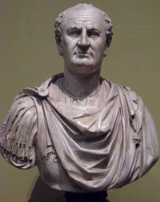
from 69 AD to 79 AD. Vespasian was the founder of the Flavian dynasty
, which ruled the Empire for a quarter century. Vespasian was descended from a family of equestrians
, who rose into the senatorial
rank under the Emperors of the Julio-Claudian dynasty
. Although he attained the standard succession
of public offices, holding the consulship
in 51 AD, Vespasian became more reputed as a successful military commander, participating in the Roman invasion of Britain in 43, and subjugating Judaea
during the Jewish rebellion
of 66 AD.
While Vespasian was preparing to besiege the city of Jerusalem during the latter campaign, emperor Nero
committed suicide, plunging the empire into a year of civil war
known as the Year of the Four Emperors
.
69 Tiberius Julius Alexander orders his Roman legions in Alexandria to swear allegiance to Vespasian as Emperor.
69 Second Battle of Bedriacum, forces under Antonius Primus, the commander of the Danube armies, loyal to Vespasian, defeat the forces of Emperor Vitellius.
69 Vespasian, formerly a general under Nero, enters Rome to claim the title of emperor.
69 The end of the Year of the four emperors: Following Galba, Otho and Vitellius, Vespasian becomes the fourth Emperor of Rome within a year.
70 Siege of Jerusalem: Titus, son of emperor Vespasian, surrounds the Jewish capital, with four Roman legions.
70 Siege of Jerusalem: Titus, son of emperor Vespasian, opens a full-scale assault on Jerusalem and attacks the city's Third Wall to the northwest.
70 First Jewish-Roman War: Siege of Jerusalem - Titus, son of emperor Vespasian, storms the Fortress of Antonia north of the Temple Mount. The Roman army is drawn into street fights with the Zealots.
79 Titus succeeds his father Vespasian as the tenth Roman Emperor.

